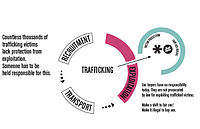
Photo from wikipedia
ABSTRACT This article explores the development and evolution of human trafficking policies in Latvia and the measurable outcomes of these policies. An analysis of policy development revealed that Latvia has… Click to show full abstract
ABSTRACT This article explores the development and evolution of human trafficking policies in Latvia and the measurable outcomes of these policies. An analysis of policy development revealed that Latvia has three different types of human trafficking policy: criminalization statutes, national action programs, and victim service provisions. These policies have produced outcomes such as criminal cases against traffickers, rehabilitation services for victims, and the formation of anti-trafficking institutions. The results revealed direct causal links between human trafficking policies and anti-trafficking institutions are evident with the National Coordinator and social services for victims. Indirect causation is also present with specialized police and prosecutor units and anti-trafficking institutional policy development by the anti-trafficking working group.
Journal Title: Journal of Baltic Studies
Year Published: 2018
Link to full text (if available)
Share on Social Media: Sign Up to like & get
recommendations!